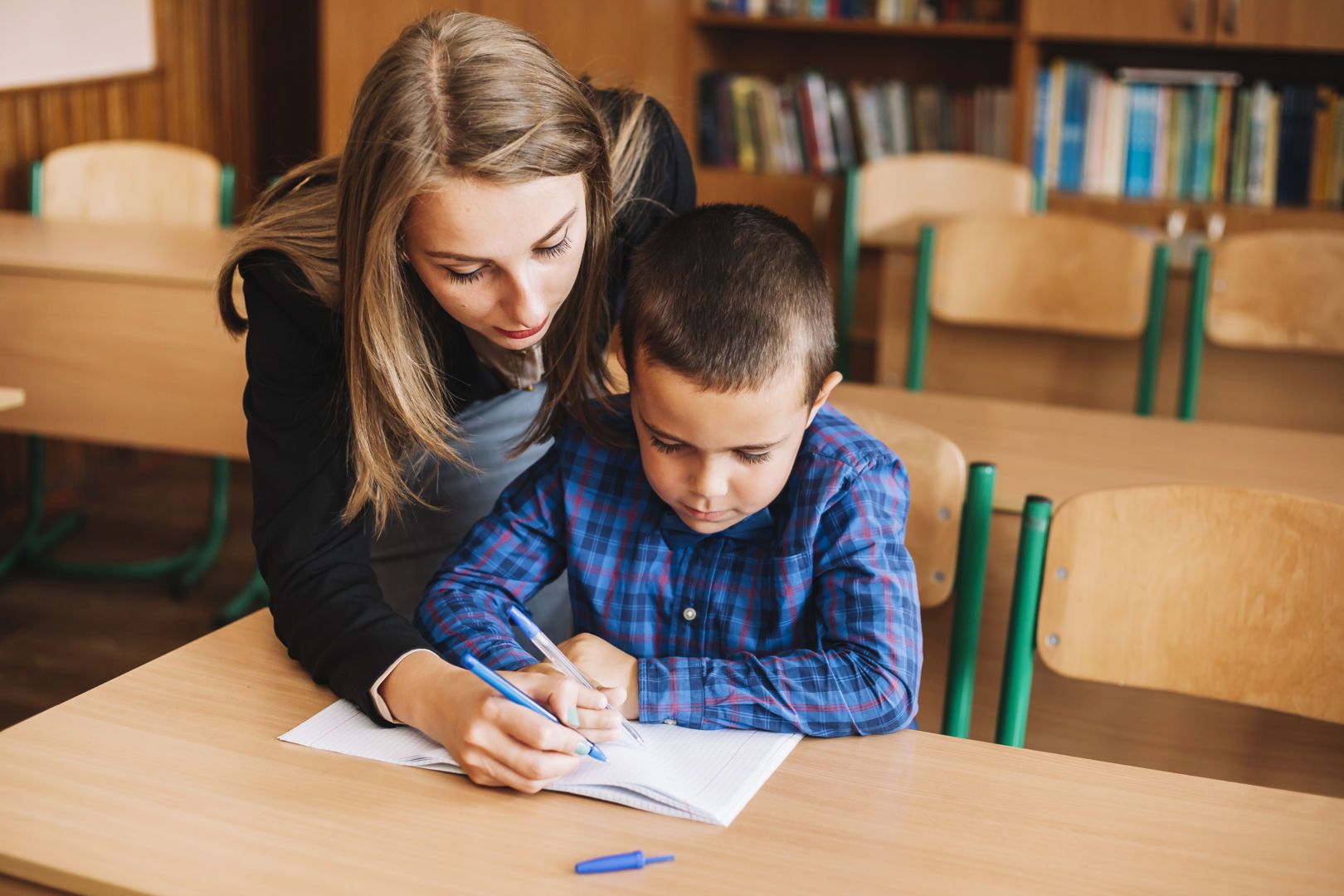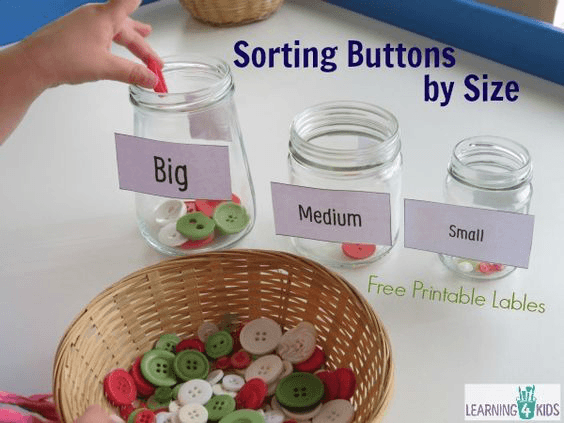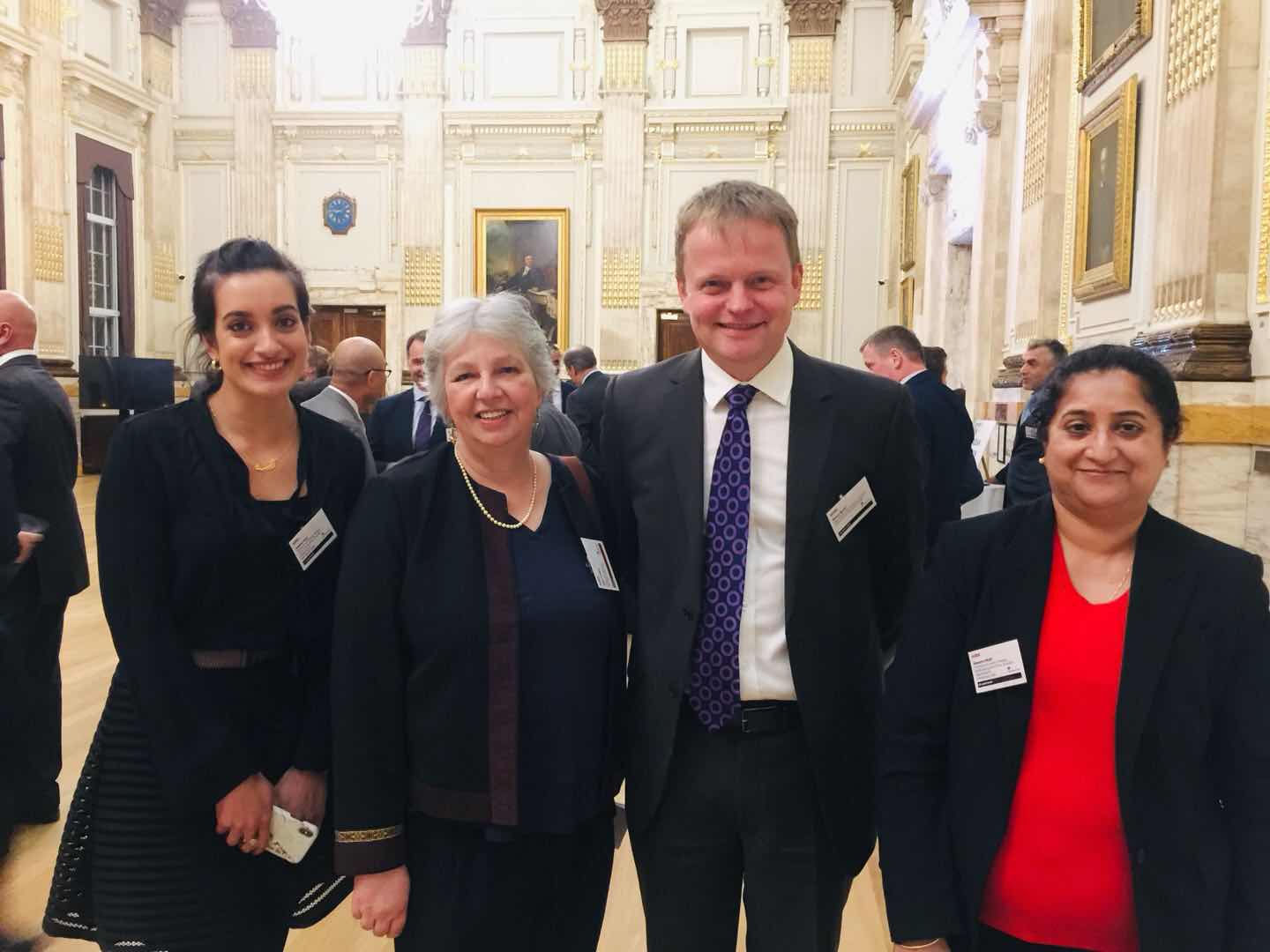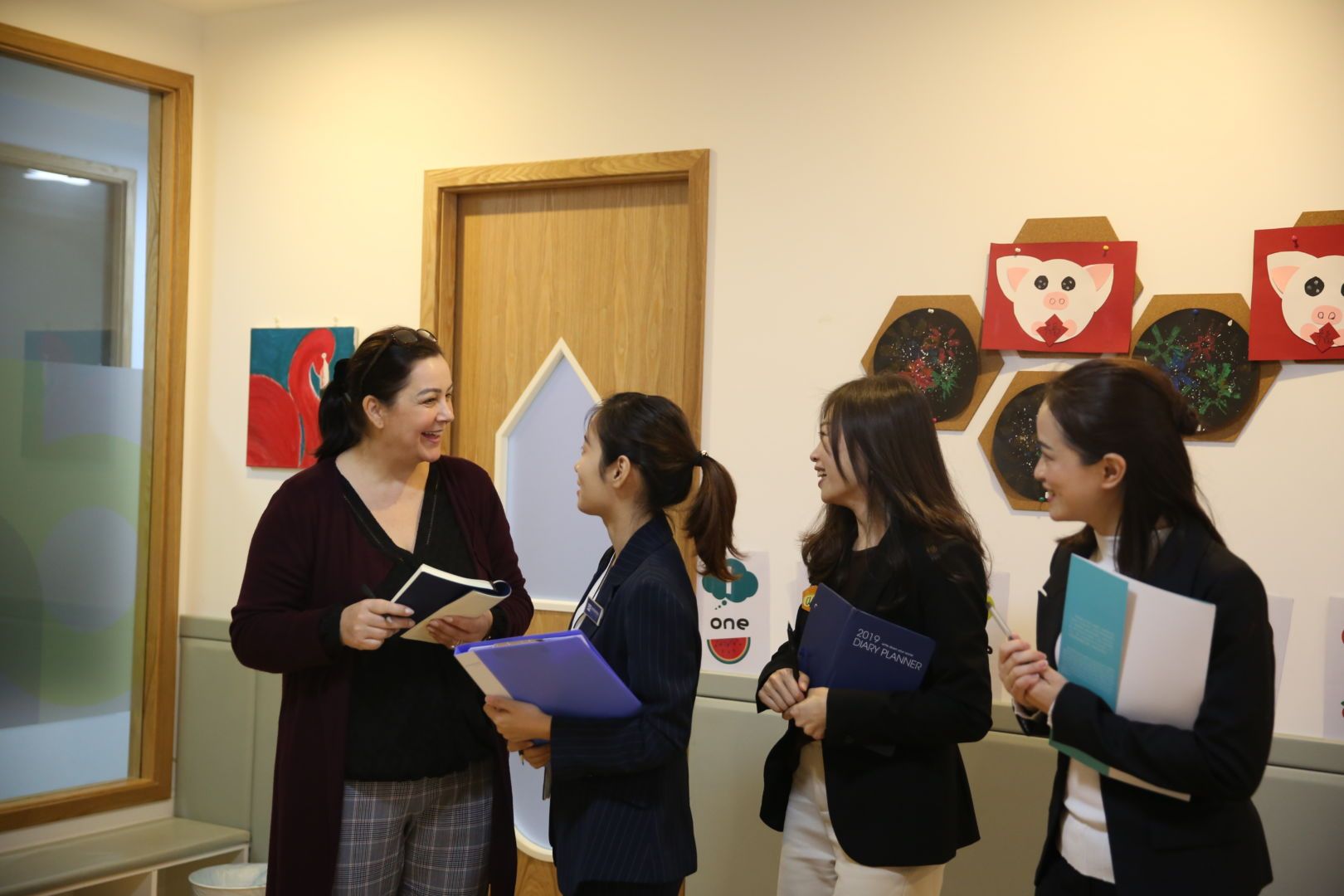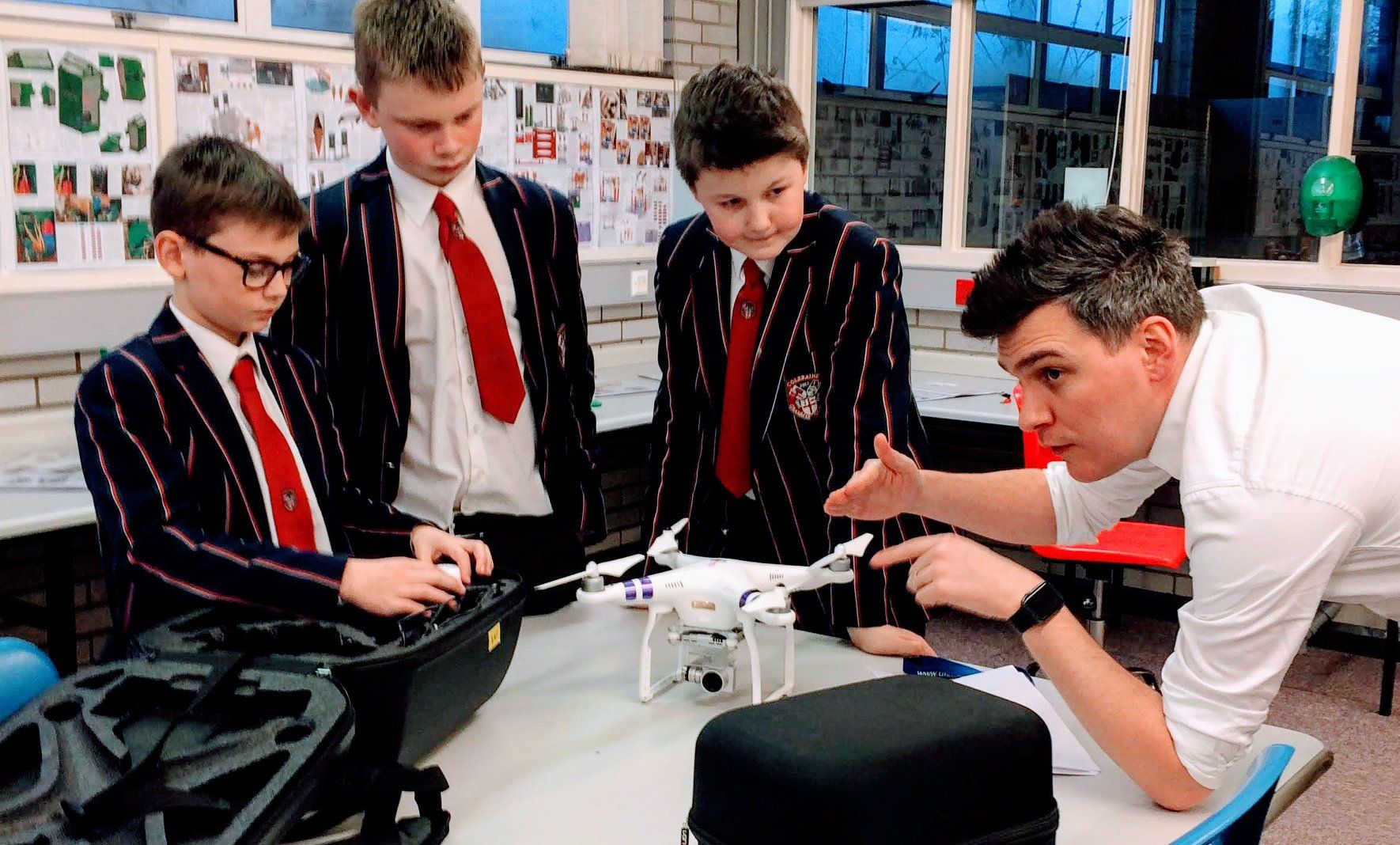How to improve children’s mathematical cognitive ability of shape, space and measurement
Early learning goal – shape, space and measurement
Children use everyday language to talk about size, weight, capacity, position, distance, time and money in order to compare quantities, objects and solve problems. They recognise, create and describe patterns. They explore characteristics of everyday objects and shapes and use a mathematical language to describe them.
Through analysing the description of shapes, space and measures as described in the “EYFS Early Years Learning and Development Goals” it is clear that at nursery level children need to learn simple shapes such as triangles, quadrilaterals and circles. In addition to this they need to learn the relationships between these different shapes and how they fit into their surrounding environment. Most artificial objects are built on these simple shapes and complex shapes in nature can also be reflections of these. As well as this the compositions and constructions of shapes are widely used in the creative industries. Therefore at EYFS level it is particularly important to gradually improve children’s mathematical cognitive ability through different methods and activities.
In view of the age associated characteristics of children at EYFS level the following eight activities are recommended to promote a child’s recognition of shape and measurement.
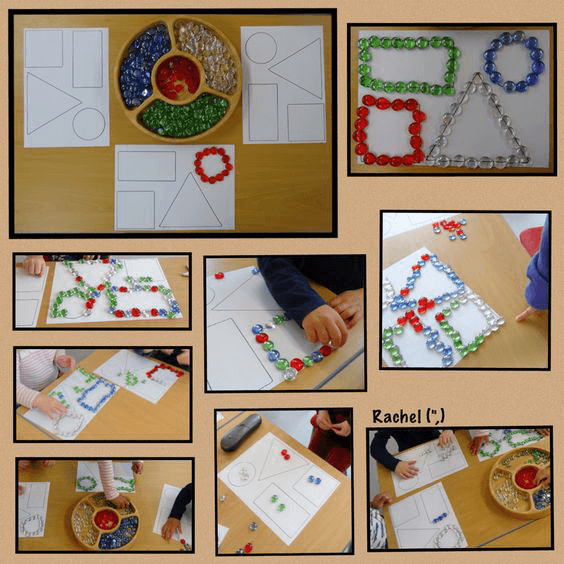
Looking for shapes in the environment
Children are investigators by nature who enjoy “treasure hunts”. Teachers should support and help develop their interest in shape recognition by placing some pre-prepared two-dimensional shapes in various environments. The teacher then can lead the children to look for squares, circles, triangles, arcs and other shapes in their environment. This can enable the children to better understand shapes and their relationship to the child’s environment.
Potato shape printing
Potatoes are halved and cut into different shape stamps (such as squares and triangles). They are then applied with paint to be printed. Printing these potato shapes on paper will engage children as they can observe first hand and participate directly with enjoyment. This creative task is also a good way for children to discuss the shapes they have created with each other.
Car competition
This is a small scientific activity to develop a child’s ability to measure. The first step is to place a long cardboard tube at an angle making a slope and measure a long strip of paper of a fixed length to be secured at the bottom. The next step is to encourage children to take turns placing small cars at the top of the slope and observe how far they roll down the pipe and on to the paper below. Teachers can add numbers to the paper so that children can more easily measure the rolling distance of their cars.
Measuring the body
Measuring the body is an interesting and simple way to learn how to measure. This activity can be carried out indoors with large sheets of paper and pens or on the ground using chalk. Children can take turns lying on the ground and drawing shapes around each other. Following this, they can use rulers or tape to measure different body parts such as their arms, legs, feet, etc. Children can compare their measurements with their friends to improve their ability to interact and cooperate with each other.
Sorting size
This activity uses a variety of resources such as shells, buttons or dolls. A set of items of different sizes and three different jars or bowls are given to the children. They are then asked to classify these objects into small, medium and large sizes and put them in the corresponding bowl or jar. In this process, children learn to compare items to each other, before sorting them into the right bowl or jar.
Making shapes out of paper tape
Paper tape can be used to mark out large shapes on the floor. Children use building blocks such as Lego or toy bricks to cover the taped outline and thus create various shapes on the floor. This helps to better develop children's shape recognition and measurement capabilities.
Continual sand supply in sandy area
Games involving sand and water are another great way to help children develop early measurement concepts. Nursery teachers and parents can both provide a variety of sand material and children must independently add to this when necessary. The process of checking that their sand supply is sustainable will help improve children's mathematical ability. The game allows children to learn to compare different quantities all whilst enjoying the simple process of filling and emptying containers. They use everyday language to describe positions and when expressing size, so they gradually improve their perception of shape, space and measurement.
Collage game
Through creative collage games children's perception of shape can be further enhanced. For this activity adults will need to cut lots of different shapes from various materials. Children then use these cut-outs to create shape combinations which may result in the creation of aliens, space rockets and many more images. Through these creative works (like the one pictured below) they learn to combine different shapes to create new and unique illustrations.
Additionally there are many more activities and methods to enhance children's understanding of shape and ability to measure. The combination of learning about flat two-dimensional shapes and three-dimensional spaces serves to better cultivate children's overall perception of space, plane shape and measurement. Furthermore it is extremely important that early childhood teachers observe, record and reflect on each child’s development of shape, space and measurement.
The Future of the UK Education Sector - Challenges and potential on a world stage
Education Stakeholder Event 2019
BIEA CEO Nikki Collins joined other senior managers from the education sector to discuss education strategy for the UK.
Hosted by the Department of International Trade at The Institute of Engineers the discussion focused on where UK education should be pending Brexit. The goal is to keep the UK at the forefront of international education.
Dr Liam Fox MP, Secretary of State for International Trade said that Early Years, distance learning and vocational training are key to international collaboration.
BIEA is constantly developing new products and services tailored to the needs of emerging educational markets such as that in China. BIEA launched the Early Years League to assist educators and teachers in implementing the Early Years Foundation Stage to their environments.
The E-League programme ties in with UK government policy of supporting the Chinese in finding a solution to their shortage of skilled Early Years teachers.
Damien Hindes, the Education Minister, spoke of the value of international education to British society, “International students bring far more than just financial benefits to the UK, they also bring cultural diversity.” He also added, “It’s never been more important to be globally minded, outward looking and ambitious than it is today. The competition has never been more fierce and the opportunities never greater.”
The audience were very impressed by the progress of the BIEA International STEM competition. 45 teams from 18 different countries are now translating their designs into working models for the finals. The competition is an exciting focus of many ideas and designs and will also provide an excellent opportunity for international dialogue and friendship.
Nursery member of the BIEA E-League “Beyond R.” has finished their preliminary EYFS examination and IS expecting more children to benefit from professional EYFS education
The British International Education Association (BIEA) Early Years League (E-League) was launched in November 2018. The aim is to provide the best British early years education (Early Years Foundation Stage) training and resources for international education practitioners so that children and their parents could benefit from a British educational experience. The following month the child care institution Beyond R. submitted their applications for gaining EYFS accreditation and nursery membership to the BIEA E-League Committee. Since January 2019 Beyond R. has become a member of the E-League nursery member via the qualification examination of BIEA E-League UK Committee. In March Sharron Fogarty, Head of E-League, visited the nursery to complete the preliminary examination on behalf of the BIEA.


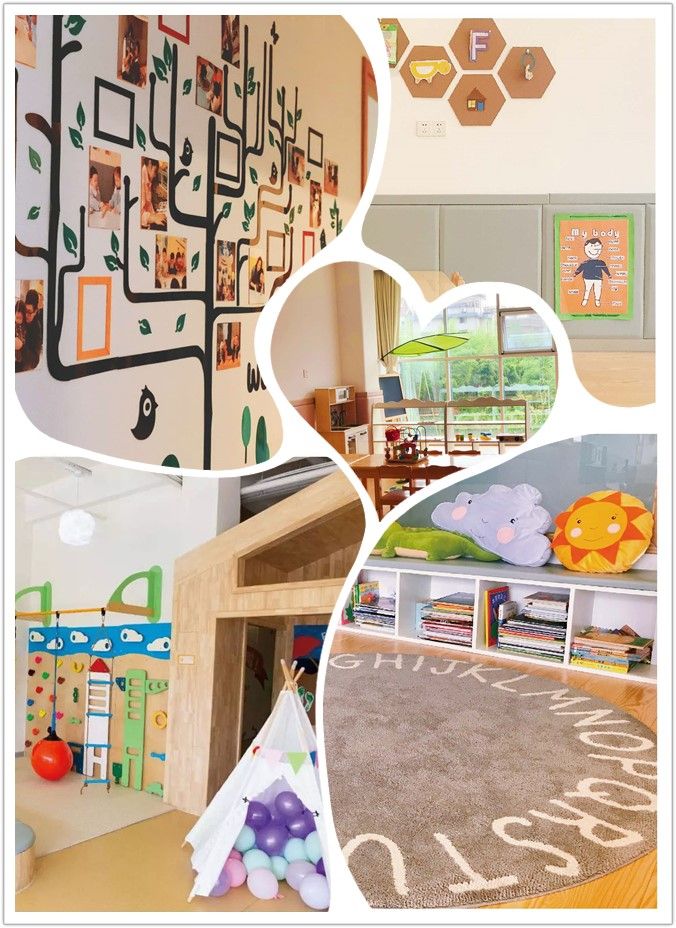

The British EYFS has always been a highly praised early years education system throughout the world and the emerging international education market represented by China is in favour of such an EYFS system. However, how to introduce a purely British EYFS into nurseries is a difficult problem for many private early years education institutions in China. BIEA is a British local educational institution supported by the UK Department of International Trade (DIT) and other British institutions. E-League brings together the UK's high-quality educational resources and UK EYFS experts. It has the ability and the advantages to provide the most comprehensive and professional EYFS teaching guidance for the members of the alliance.
The BIEA E-League Committee will assist the organisation to make more professional and comprehensive EYFS teaching while maintaining its original characteristics through teacher training, British research, providing guidance, teaching courses related support.
BIEA believes that combining the school-running philosophy of Beyond R. "Looking at the World with the Eye of Discovery" with the comprehensive British educational resources of E-League, a broader EYFS teaching world is found, delivering better international learning courses for children in the League and bring parents a better experience of international homeland co-education!
45 Teams from 18 countries and regions advance to BIEA 2019 International STEM Competition
Students from Coleraine Grammar School in Northern Ireland, UK learn how to fly a drone with Alan Hook, Associate Head of School (Media) at Ulster University, Coleraine.
Early today, British International Education Association (BIEA) in association with Born Free Foundation announced the shortlist for 2019 BIEA International STEM Youth Innovation Competition.
Since the launch in January 2019, there has been huge interest from schools and teachers from around the world. With the competition reaching 30,000 schools globally, drawing applications from 34 countries and regions through the support of its partnership. After an intensive and rigorous marking process, 45 teams are through to the next round based on their qualification scores, representing 18 countries and regions including UK, China, USA, Australia, Canada, India, Kenya and many others.
Each year a theme connecting world issues and technology is chosen for the competition, which will be announced in January and the finals will be held in July. This year’s theme is “Fighting Extinction via Drone Technology”. Teams are asked to come up with a drone design to aid in the conservation of endangered species, and projects submitted in the first round focused on an enormous variety of endangered animals, including snow leopards, black rhinos, pangolins, turtles, elephants and many more.
In the next round, qualifying teams will modify/build a drone to reflect their report design ideas as laid down in the first round within a fixed budget. They are required to submit two videos by 4th June, one to demonstrate their drone in action and able to complete a set of tasks, a second video to visually present an outline of their project to date. In the meantime, BIEA STEM Ambassadors will visit shortlisted teams and support their innovation projects.
Upon successful submission of the videos, teams are invited to come to the international final at the London Royal Air Force Museum on 4th July, with a public showcase of their projects and presenting to a panel of expert judges. A grand prize of £5,000 is waiting for the top team, a variety of other prizes across the age categories will be awarded to participating teams.
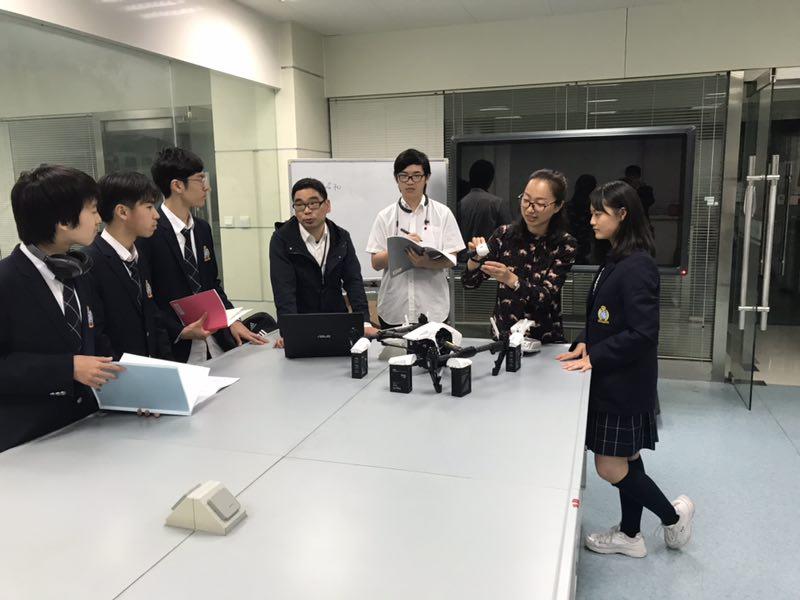

Teacher and students from No. 2 High School Attached to East China Normal University in Shanghai, explore components of drone as part of their investigative report.
About the competition
The annual BIEA International STEM Youth Innovation Competition is BIEA’s flagship programme designed to encourage students to pursue study and careers in science, technology, engineering, and math (STEM). It presents a unique opportunity to motivate the next generation of leaders who will change the way we explore and connect in the world. One theme is chosen each year to reflect the pressing issues and challenges in today’s world and how technology could be used to in solving these challenges. The competition spans three age ranges: 9-11, 12-14 and 15-17. Entry teams are made up of 3-5 students supported by a teacher, where teamwork is an important component of the competition. There are five main components to the competition: report writing, innovation, presentation, Dragon’s Den style pitching and fixed tasks.
BIEA promotes friendly competition among teams from diverse socio-economic backgrounds, ethnicities, and geographies – from emerging towns in Nigeria to historical capital city of China. Numerous teams are engaging in fundraising campaigns in their communities to make their participation this year possible.
Quotes
“The overall quality of the reports was astounding, more so when we consider that many young people were submitting reports in a second language. In some cases, the standards of secondary research and innovative experimental investigations to gather primary data for drone specifications were worthy of undergraduates rather than secondary school students.”
Dr Alex Holmes, Lead Competition Judge
“BIEA aims to bring together educators and young people of all ages from around the world who share a passion for Science, Technology, Engineering and Mathematics (STEM). We hope our chosen topic will not only illustrate to the audience the importance of technological innovation when it comes to environmental protection, but also inspire the next generation of STEM graduates to put their minds to solving these pressing world issues”.
David Hanson, STEM Chairman, BIEA
“Wildlife is coming under increasing threat from human actions so Born Free is thrilled to be partnering with BIEA on this competition. It’s a chance to help the next generation understand the real-world application of STEM skills. How we can effectively use technology to protect and monitor wildlife populations could be the difference between extinction and survival for some of the world’s most threatened species.”
Laura Gosset, Head of Education, Born Free.
Follow and support your local team on the road to the International Finals using the official hashtag: #BIEACompetition
For more information about the BIEA International STEM Innovation Competition and to view the complete list of shortlist teams, visit our site: www.bieacompetition.org.uk/announcement, or follow BIEA @BIEAeducation on Twitter.
BIEA Grants Membership Certificate of E-League to Shanghai Duimohn Bilingual Children's Education School
Ms. Sharron Fogarty Head of Early Years at the British International Education Association (BIEA) attended the opening ceremony of the Duimohn Bilingual Children's Education School in Shanghai on March the 23rd. There she was pleased to issue a certificate of membership of the BIEA E-League to the Duimohn school.
Ms Fogarty was invited to the opening ceremony by the Duimohn School leader Maggie. Ms Fogarty, as a representative of the BIEA E-League, along with other guests and parents witnessed the beginning of a new chapter of British EYFS education in China with the opening of the school in Shanghai.
As the main support content of BIEA and BIEA Early Years League (E-League), the Early Years Foundation Stage (EYFS) is the provider of the British early years basic education practice. It supplies the members of the alliance with expert guidance, comprehensive EYFS teacher training, access to British research along with EYFS certification and other forms of early years educational support. As a member of the BIEA E-League, Duimohn Bilingual School will enjoy all the rights and interests of other BIEA British educational institutions whilst gaining the support of E-League British early YEARS educational resources.
As a representative of the BIEA E-League committee, Ms Fogarty gave a speech outlining the educational philosophy and aims of the BIEA E-League to the assembled guests and parents.
Director Fogarty said that EYFS, as one of the best early years education systems in the world, is following the four principles of "respecting a child’s personality, promoting positive relationships and providing and enabling the educational environment to promote the learning and development of children". Since its implementation in nurseries, schools and nurseries in the UK EYFS has been enthusiastically praised by parents and highly recommended by the international early education community. Ms Fogarty also gave a detailed introduction to the methods of the EYFS in bringing up children in a favourable learning environment and the positive conclusions resulting.
A clearer understanding of the goals of the EYFS and an explanation of its wider aims was greatly appreciated by the audience who gave enthusiastic applause to Ms Fogarty’s speech.
As living standards rise along with higher incomes in China, the demand for good and comprehensive early years education has created a booming market in that area. The unprecedented opportunities for development has provoked interest from many leading international educational groups. As one of the world's most authoritative standards for early years education, the British EYFS has attracted more and more attention from Chinese parents and early years professionals.
With the opening of a Chinese Bilingual school for children and its preliminary favourable evaluation by the BIEA E-League committee, the British EYFS bilingual system has been successfully introduced. A successful and comprehensive early years bilingual education, to provide a wider international and cultural interest in the young, has now been made available for the children in Shanghai.
Duimohn Bilingual Children's School will uphold the characteristics of EYFS as practiced in the UK and will provide music and art lessons, sport activities, picture book reading and basic understanding courses according to the EYFS programme. The target group is children up to the age of six. Classes will be held with the parent up to the age of three and from then on independently all carried out in a comprehensive and where possible, bilingual manner.
There is no doubt that the concept of international education has been enthusiastically welcomed and sought by more and more parents.
BIEA believes that under its guidance the Duimohn bilingual children’s school, and with the supervision of the introduction of the EYFS by the committee of the BIEA E-League, that the school will become a shining example of an international nursery amongst the many operating in Shanghai and contribute to the enthusiasm and growth to the internationalisation of China’s early years education programmes.
The second phase of EYFS training has been successfully completed
The second phase of BIEA E-league EYFS training was concluded and understood sooner than the lecturers had expected. The four-day EYFS teaching course integrating theoretical knowledge with teaching cases, classroom practice and other methods of learning not only lays down a solid foundation for the teachers participating but also broadens their framework for practice. The core of the course not only made the teaching atmosphere pleasant but was praised by all afterwards. Now let us explain the content of the four-day EYFS teaching course.
I. Essentials of EYFS Cycle
EYFS observation
Understanding the different types of observation records (including methods of key observation, closed and open data observation, shorthand, the "wow" moment, checklist, time sampling as well as event sampling etc.).
When making observation records, the most suitable method will be selected according to the situation at the time.
When EYFS observation is connected with EYFS learning development goals, we can record children's early years learning and development goals in the EYFS programme document.
EYFS evaluation
Understand the different types of EYFS evaluation (first evaluation, progress review, two-year-old progress check and EYFS portfolio) and the differences in content performance of each type of evaluation.
Learn to judge what developmental state a child is in (starting or more secure).
EYFS plan
Grasp when the entry point of the next step in the plan occurs and understand the key points of the different types of plan formulation through observation, recording and evaluation (e.g. long-term plan emphasises extensive overview, medium-term plan emphasises more details, short-term plan emphasises more specific details, etc.).
Master the idea of formulating the theme plan and learn how to apply the idea of the EYFS theme plan to other, differing theme plans.
2. Misunderstandings in teaching that should be avoided
Participants asked how to distinguish the roles of key people such as teachers and assistants in the observation records?
The lecturer, Sharron, explained that the key person is mainly responsible for collecting observational records whilst the assistant is responsible for assisting in collating those observational records. In most nurseries a teacher is the key person.
Students asked how would children behave when being videoed or photographed for observation purposes? Would they be distracted or behave differently? How can they deal with such a situation?
Sharron explained that nurseries in Britain face a similar problem and teachers will ask for the children's consent before they take a video or photograph. The children are not too curious about that behavior from the teacher. Video and photography are an excellent and convenient means of sharing children’s development with their parents as well as understanding the child’s needs.
3. Understanding British nurseries teaching aids
In addition to the training of teaching content, local teaching aids suppliers from the BIEA member marketplace also attended the training classes to demonstrate the teaching aid products popular in nurseries in the UK; some of which astonished those present.
4.Obtaining British CPD Certificate
At the end of the three-day course, the BIEA E-League issued the British Continuing Professional Development (CPD) Certificate for the teachers who participated in the training. The certificate was approved by the British CPD Certification Authority which is valid that the teachers have received systematic EYFS teaching training.
The vocational training system in British education is very mature. The professionals and teachers involved in Britain’s educational system have to accumulate a certain amount of hours of vocational training yearly to ensure that they remain at their professional level.
5. Teacher's Evaluation
The teachers who attended the EYFS course delivered by Sharron are confident and eager to put into practice what they have understood and learnt. The third phase of EYFS training will take place on 27 April 2019 in China.
Sino-British STEM Youth Exchange Project is expected to be allocated in Shanghai
Nikki Collins Managing Director and Mikky Ho China Chairman of the British International Education Association (BIEA) were invited to attend the Sino-British Youth STEM Exchange Symposium and its signing ceremony in Shanghai on March the 22nd. Wunan Xiao the Executive Vice-Chairman of Asia-Pacific Exchange and Cooperation Foundation (APECF) along with Xiaozong Zhang, Director of the Liaison Department of China International Cultural Exchange Centre (CICEC) and Guohua Yuan the President and Zhong Jin the Secretary of the Shanghai Lingang Economic Development (Group) Co.
Under the Aegis of the China International Youth STEM Centre, the Sino-British STEM Youth Exchange Project consists of the BIEA International STEM Youth Innovation Competition, a STEM International Youth Base, the International Youth Leadership Club and the International STEM Youth Research Centre. The aim of the project is to discover and cultivate young talent in science and technology of a high quality at an international level. It also aims to increase the level of teenager’s STEM education by incubating STEM projects so as to pool co-operation and discovery via the International Youth Exchange platform.
President Guohua of the Lingang Group gave a welcoming address. It is the Spring Equinox, and the education of teenagers is similarly a story of spring. He spoke of China’s desire to build an innovative society and country. He stated that it is the mission of every enterprise to cultivate talented young people. The key to the development of the country and its enterprises is the development of its talents. Britain is very experienced in training future talent. With the participation of BIEA many innovative ideas and elements will be injected into the Sino-British STEM Youth Exchange Project. All the institutions present were mainstays in the field of cultural and educational exchanges between China and the UK. He hoped all would speak freely and make suggestions for the promotion of Sino-UK exchanges in the field of science and the education of young people and contribute to the enhancement of friendship between China and the UK.
Secretary Zhong of Lingang Group stated that Shanghai is one of the leading international metropolitan areas in China and is one of the main windows enabling the rest of world to understand China and partake in its economy. As the only large-scale state-owned enterprise under Shanghai Guozi Wei, Lingang Group has built many high-quality industrial parks and sites, whether high-tech or otherwise, over the last ten years. As a builder concerned with urban renewal, Lingang group is upgrading its projects under the wave of reform in the new era of China and is actively introducing new industrial enterprises involving culture, science and technology.


Nikki Managing Director of BIEA watches the Sand Table of the Lingang Industrial Zone in the Lingang Exhibition Hall
Chairman Wunan of the APECF pointed out that it was precisely the attention and enthusiasm of all the distinguished guests, representing science and technological innovation in education, present that had led to the proposal of Sino-British STEM Youth Exchange Project. This project focuses on STEM and will be of great benefit to the future. Technological education is both a simple and complex subject. BIEA will provide with professional British-style STEM resources and the Lingang Group will provide us with the supporting space to house STEM projects. Fostering the technological and scientific education of adolescents is a complex and long project.
Nikki thanked all the participants for their recognition and support. As a non-profit educational organisation promoting British-style international education to countries outside the UK this was greatly appreciated. The BIEA came into being in the wake of Britain's proposed change in its relationship with Europe in 2016. Since its establishment it has been working to build a level of direct dialogue and exchange within the global educational system. Taiwan aims to broaden its international horizons in the educational field and upgrade its current practices. BIEA's abundant British educational resources and overseas development model are supported by official bodies such as the UK Department of International Trade and British Council. BIEA’s main business involves early years education, STEM education and focusing on the International STEM Youth Innovation Competition. The BIEA STEM League (S-League), a key project in STEM education, has attracted much attention from institutions and enterprises within education in China. It is the aim of BIEA's STEM education that young students and educators in China benefit from Britain's advanced and mature STEM education system.
Nikki also mentioned that BIEA held its first STEM Conference in London at the beginning of this year and that it had attracted worldwide attention. At the same time more than 32 countries and regions had registered for the International STEM Youth Innovation Competition, including several Chinese school teams, in just two months. The competition is the best interpretation and illustration of STEM's educational concept in Britain. It is not only intended to cultivate student’s technological innovation skills, but also to connect young people from all over the world in using technology to provide humane and positive solutions to worldwide problems.
The participants agreed that the Sino-British STEM Youth Exchange Project is an international and large-scale science and technology effort that gathers high-quality resources from the cultural, educational and scientific communities of China and Britain. Its creation will attract global attention and become an important part of China, Britain’s and the world's youth talent development plans.
CICEC, APECF, the Lingang Group and BIEA signed a memorandum of cooperation on the joint construction of the Sino-British STEM Youth Exchange Project at the conclusion of the symposium.


The BIEA delegates took photos with Chairman Wunan and Secretary Zhong in Sany Group
Under the invitation of Secretary Zhong of the Lingang Group, the participants of the symposium visited China's science and technology project at the Lingang Youth Science and Technology Exhibition Base, Sany Group and the Shanghai Yidasheng Science and Trade Co., Ltd.
The UK Department of International Trade (DIT) fully supports implementation of BIEA's projects in China
On 21st March Nikki Collins, Managing Director of the British International Education Association (BIEA), Mikky Ho, Greater China Chairman and Alex Zhang, Director of International Development, met with Xiaojing Wang, Head of Early Years and English Language and Clair Tan, Senior Trade and Investment Officer of the UK Department of International Trade (DIT) to discuss how to support the development of British education in China especially the development of BIEA projects in that field.
DIT is an UK governmental body that assists British companies to flourish in the global economy and, likewise, supporting overseas companies in investing in the UK economy. The DIT has been actively promoting the development of UK and Chinese companies, especially in the field of education, since setting up offices in the British Consulate in China. At the beginning of 2018 British Prime Minister Theresa May's visit to China reached a 550 million pound British-Chinese educational cooperation project led by the British Department of International Trade, which involved exchanges in vocational education, in early years education and educational technology.
As a not-for-profit educational organisation that promotes British-style international education to countries outside the UK, BIEA has steadily grown from its inception in 2016. Since its establishment it has been working to build a platform for educational dialogue and exchange within the global education system. The main objective is in supporting educational practitioners and investors in implementing international education systems. The main operational focus of BIEA at present is early years education, furthering STEM education internationally and promoting the BIEA International STEM Youth Innovation Competition.
Xiaojing expressed a high appreciation of BIEA's British educational platform and its overseas development model. She also briefed BIEA on the experience and policy directions of the DIT in promoting exchanges and co-operation between China and the UK in the field of education. She also pointed out that China is placing a high emphasis on the development of early years and STEM education.
Nikki outlined the Early Years League (E-League) project launched by BIEA in China last year is enthusiastically welcomed by early years education institutions and practitioners in China. BIEA EYFS Co-operative E-League Nurseries have now been put into operation in China. Many early years educators have visited the UK for educational experience and instruction. Nikki also outlined BIEA’s work in the STEM field. Along with the STEM League (S-League), which has attracted the attention of many stakeholders in the field of education in China, the BIEA International STEM Youth Innovation Competition has been greeted with enthusiasm from schools, teachers, students and their parents in China. Since the start of the competition in January this year, more than 32 countries and regions have registered to take part. Schools in many cities in China have also organised teams to participate.
Xiaojing mentioned that Geoff Gladding, Head of Education at the DIT UK head office, attended the BIEA STEM Conference and BIEA International STEM Youth Innovation Competition Launch Ceremony in London in January this year and took part in the ribbon-cutting opening ceremony. He not only supported BIEA's STEM Competition but also attached great importance to BIEA's overseas efforts in the development of British education. The UK DIT will show support to BIEA in its future implementation and development of British early years and STEM projects in China. DIT will help in spreading the BIEA STEM Competition to its international partners in educational development.
At the end of the meeting Xiaojing stressed that BIEA has abundant British educational resources which is appreciated by the Chinese market. It is hoped that BIEA will seize this opportunity to accelerate the implementation of educational projects in China. The UK DIT will maintain close contact with BIEA and fully supports BIEA in its aims.
BIEA in talks with the China Education Association for International Exchange (CEAIE) for British-Chinese educational cooperation
The British International Education Association (BIEA), a not-for-profit educational organisation promoting a British style education internationally, has steadily grown since its inception in the UK 2016. Since then it has been working to build a platform for dialogue and exchange within global education. The main objective has been to support educational practitioners and investors with implementing international education systems. The prime focus of BIEA at present is in early years education and in furthering STEM education and promoting the BIEA International STEM Youth Innovation Competition.
Nikki Collins and Mikky Ho, BIEA Managing Director and Greater China Chairman, visited the CEAIE on the 21st of March. They were warmly greeted by Xuesong Shen, deputy director of CEAIE, and along with Lidong Zhou, Senior Project Manager of CIAIE international co-operation and others, held comprehensive discussions on the development and co-operation between the UK and China in the field of education.
Xuesong explained the function of the CEAIE and its organisation especially regarding educational co-operation and exchanges with China and the rest of the world. CEAIE has been actively promoting these exchanges in the development of education, science and technology internationally via its educational exchange mechanism which was established in 1981. Many departments within the organisation have carried out research and co-operation and cultural exchanges internationally, much with the UK.
Nikki outlined the Early Years League (E-League) project launched in November last year by BIEA in China has been greeted enthusiastically by early years education institutions and practitioners. The BIEA EYFS Co-operative Nurseries of E-League have now been put into operation in China. Many early years educators have been sent to the UK for educational idea exchange and learning. Nikki also explained BIEA’s work in the STEM field. Alongside the BIEA STEM League (S-League), which has attracted the attention of many stakeholders in the field of education in China, the BIEA International STEM Youth Innovation Competition has also received a warm response from schools, teachers, students and parents. Since the start of the competition in January this year, more than 32 countries and regions have registered to take part. Schools in many cities in China have organised teams to participate in the competition.
Xuesong expressed strong interest in the E-League project and said that China's early years education is at an innovative stage. The establishment of the British Early Years Foundation Stage (EYFS) framework can be used for reference in China's early years education development. The BIEA E-League accreditation and evaluation system are of great reference value. She then gave an account of the annual teacher-training activities organised by the CEAIE.
Nikki said that the BIEA Vocational Education Training activities and the overseas edition of the British Continuing Professional Development (CPD) manual, have a similar development model to the teacher-training activities of the CEAIE. At present, BIEA has organised many teacher training activities in China with EYFS at the core of the teaching model. The vocational training system in the UK is very mature. The principals and teachers in the UK have to accumulate certain hours of vocational training every year to ensure they stay at their professional level. BIEA CPD training overseas edition, which has drawn the essence of the British education vocational training and takes account of the overseas education market environment, is a British training system designed to have high integration and applicability in the international market.
The two parties agreed that, although there are differences in education between China and the UK, the intention and fundamentals of education are very similar in their aims and the purpose of teacher vocational training. The two sides reached a consensus on the promotion of educational exchanges, cooperation and development between China and the UK. Taking this opportunity we hope to open the door of co-operation while deepening our friendship and create a better future for China and the UK in the field of international education.
An inspirational visit to Soong Ching Ling Youth Science Technology Cultural Exchange Centre
As part of its mission in China, BIEA was invited to the Soong Ching Ling Foundation in Beijing, a pioneering charity with a focus on children’s welfare and development in China. BIEA President Gareth Bullock and his team were given a warm welcome by the Foundation’s Chairman Qun Yu and he was treated to a tour of the impressive centre. The centre is flooded with natural light and open spaces and there are four themes in the centre: “Engage”, “Enlighten”, “Create” and “Inspire” These are to support the cultural development of young children who come to the centre for educational training and a recreational experience.
In the subsequent meeting with Chairman Yu, the two sides had discussions on strengthening the friendship and the promoting of educational exchanges between China and the UK. Gareth expressed great admiration for the founder, Ms. Soong Ching Ling, as a woman of great determination, as an advocate for democracy and a champion of education. He also praised the extensive charitable work the foundation has been doing in supporting the future generations in China.
Gareth and Chairman Yu discussed BIEA’s International STEM Youth Innovation Competition. Originating in the UK, the competition is designed to cultivate the technological skill of the young people and to encourage them to consider these concerning global issues as well as providing a platform for them to connect with each other.
Chairman Yu said that the Foundation also held a science competition for teenagers and children in China involving many local primary and secondary schools. He welcomed co-operation between the two organisations and invited the BIEA STEM Competition to be held in China. Both competitions are complimentary to each other and offer greater opportunities for young people on an international level.
Chairman Yu said he would be delighted to come to London in July this year to watch the final of BIEA International STEM Youth Innovation Competition and to cheer on the China team.
The two sides also discussed the current situation and development of early years education in the UK and China. Gareth said that the Early Years Foundation System (EYFS) is one of the world’s leading frameworks relating to early years education. The BIEA Early Years League (E-League) project, with EYFS at its core, has been welcomed by Chinese early years practitioners since its launch in China last year. A large number of practitioners and nurseries have benefited from the expertise of the BIEA E-League team in helping them to understand the EYFS framework and supporting them in its implementation.
Chairman Yu also commented that early years education in China is at a critical stage of development and innovation. The Soong Ching Ling Foundation is a pioneer in early years education in China and is actively developing resources and concepts from the international arena to support Chinese early years educational provision.
Lastly, the two sides agreed that education is one of the most important areas in which China and the UK can build a long-lasting relationship. With a common aim of providing the best opportunities for future generations, this meeting could be the beginning of in-depth cooperation.
In attendance:
Chen Aimin, Director of International Cooperation and Exchange.
Wang Jiajia, Director of the International Department, Director of Soong Ching Ling Youth Science, Technology and Culture Exchange Centre.
Guo Xinbao, Vice Director of Soong Ching Ling Youth Science, Technology and Culture Exchange Centre.
Wang Bei, Director of the Foundation and Chairwoman of Aijia Group.
Nikki Collins, BIEA Board Secretary General and CEO.
Alex Zhang, BIEA International Development Director.

